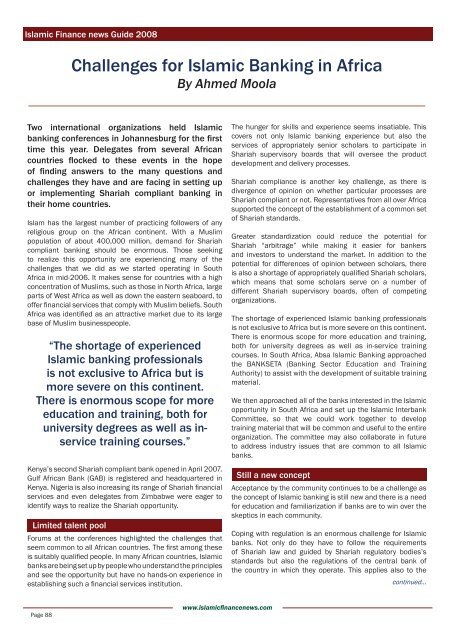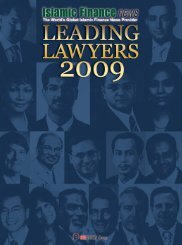Create successful ePaper yourself
Turn your PDF publications into a flip-book with our unique Google optimized e-Paper software.
<strong>Islamic</strong> <strong>Finance</strong> news Guide 2008<br />
Page 88<br />
Challenges for <strong>Islamic</strong> Banking in Africa<br />
By Ahmed Moola<br />
Two international organizations held <strong>Islamic</strong><br />
banking conferences in Johannesburg for the fi rst<br />
time this year. Delegates from several African<br />
countries fl ocked to these events in the hope<br />
of fi nding answers to the many questions and<br />
challenges they have and are facing in setting up<br />
or implementing Shariah compliant banking in<br />
their home countries.<br />
Islam has the largest number of practicing followers of any<br />
religious group on the African continent. With a Muslim<br />
population of about 400,000 million, demand for Shariah<br />
compliant banking should be enormous. Those seeking<br />
to realize this opportunity are experiencing many of the<br />
challenges that we did as we started operating in South<br />
Africa in mid-2006. It makes sense for countries with a high<br />
concentration of Muslims, such as those in North Africa, large<br />
parts of West Africa as well as down the eastern seaboard, to<br />
offer fi nancial services that comply with Muslim beliefs. South<br />
Africa was identifi ed as an attractive market due to its large<br />
base of Muslim businesspeople.<br />
“The shortage of experienced<br />
<strong>Islamic</strong> banking professionals<br />
is not exclusive to Africa but is<br />
more severe on this continent.<br />
There is enormous scope for more<br />
education and training, both for<br />
university degrees as well as inservice<br />
training courses.”<br />
Kenya’s second Shariah compliant bank opened in April 2007.<br />
Gulf African Bank (GAB) is registered and headquartered in<br />
Kenya. Nigeria is also increasing its range of Shariah fi nancial<br />
services and even delegates from Zimbabwe were eager to<br />
identify ways to realize the Shariah opportunity.<br />
Limited talent pool<br />
Forums at the conferences highlighted the challenges that<br />
seem common to all African countries. The fi rst among these<br />
is suitably qualifi ed people. In many African countries, <strong>Islamic</strong><br />
banks are being set up by people who understand the principles<br />
and see the opportunity but have no hands-on experience in<br />
establishing such a fi nancial services institution.<br />
www.islamicfi nancenews.com<br />
The hunger for skills and experience seems insatiable. This<br />
covers not only <strong>Islamic</strong> banking experience but also the<br />
services of appropriately senior scholars to participate in<br />
Shariah supervisory boards that will oversee the product<br />
development and delivery processes.<br />
Shariah compliance is another key challenge, as there is<br />
divergence of opinion on whether particular processes are<br />
Shariah compliant or not. Representatives from all over Africa<br />
supported the concept of the establishment of a common set<br />
of Shariah standards.<br />
Greater standardization could reduce the potential for<br />
Shariah “arbitrage” while making it easier for bankers<br />
and investors to understand the market. In addition to the<br />
potential for differences of opinion between scholars, there<br />
is also a shortage of appropriately qualifi ed Shariah scholars,<br />
which means that some scholars serve on a number of<br />
different Shariah supervisory boards, often of competing<br />
organizations.<br />
The shortage of experienced <strong>Islamic</strong> banking professionals<br />
is not exclusive to Africa but is more severe on this continent.<br />
There is enormous scope for more education and training,<br />
both for university degrees as well as in-service training<br />
courses. In South Africa, Absa <strong>Islamic</strong> Banking approached<br />
the BANKSETA (Banking Sector Education and Training<br />
Authority) to assist with the development of suitable training<br />
material.<br />
We then approached all of the banks interested in the <strong>Islamic</strong><br />
opportunity in South Africa and set up the <strong>Islamic</strong> Interbank<br />
Committee, so that we could work together to develop<br />
training material that will be common and useful to the entire<br />
organization. The committee may also collaborate in future<br />
to address industry issues that are common to all <strong>Islamic</strong><br />
banks.<br />
Still a new concept<br />
Acceptance by the community continues to be a challenge as<br />
the concept of <strong>Islamic</strong> banking is still new and there is a need<br />
for education and familiarization if banks are to win over the<br />
skeptics in each community.<br />
Coping with regulation is an enormous challenge for <strong>Islamic</strong><br />
banks. Not only do they have to follow the requirements<br />
of Shariah law and guided by Shariah regulatory bodies’s<br />
standards but also the regulations of the central bank of<br />
the country in which they operate. This applies also to the<br />
<strong>continued</strong>...

















